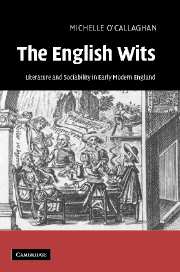Book contents
- Frontmatter
- Frontispiece
- Contents
- Acknowledgements
- Note on the text
- Introduction
- Chapter 1 Gentleman lawyers at the Inns of Court
- Chapter 2 Ben Jonson, the lawyers and the wits
- Chapter 3 Taverns and table talk
- Chapter 4 Wits in the House of Commons
- Chapter 5 Coryats Crudities (1611) and the sociability of print
- Chapter 6 Traveller for the English wits
- Chapter 7 Afterlives of the wits
- Notes
- Bibliography
- Index
Chapter 4 - Wits in the House of Commons
Published online by Cambridge University Press: 22 September 2009
- Frontmatter
- Frontispiece
- Contents
- Acknowledgements
- Note on the text
- Introduction
- Chapter 1 Gentleman lawyers at the Inns of Court
- Chapter 2 Ben Jonson, the lawyers and the wits
- Chapter 3 Taverns and table talk
- Chapter 4 Wits in the House of Commons
- Chapter 5 Coryats Crudities (1611) and the sociability of print
- Chapter 6 Traveller for the English wits
- Chapter 7 Afterlives of the wits
- Notes
- Bibliography
- Index
Summary
Writing to Sir Edward Phelips from Ajmer, Coryate asked to be remembered to his son, Sir Robert, and ‘M. Martin also, M. Christopher Brooke, whom I thanke still for his no lesse elegant then serious verses: M. Equinoctiall Pasticrust [John Hoskyns] of the middle Temple, M. William Hackwell, and the rest of the worthy gentlemen frequenting your Honourable table, that favour vertue, and the sacred Muses’ (Traveller, pp. 8–9). Coryate will send his remembrances once more to these men in his letter addressed to the Sireniacal fraternity. The men Coryate identifies were predominantly Middle Temple and Lincoln's Inn lawyers who sat in the first Jacobean parliament, which met in 1604 and was finally dissolved at the end of 1610 – Sir Edward was Speaker in the House of Commons in this parliament, and Hoskyns, Brooke, Hakewill and Sir Robert would go on to sit in the 1614 ‘addled’ parliament. The company at Sir Edward's table engaged in conversations and practised modes of sociability that were an extension of their complex civic and social identities. They had strong civic credentials as lawyers and members of parliament, as well as connections with Prince Henry's court and the city. When Martin assumed the role of parrhesiastes in his speech welcoming James to London, he was authorised to speak frankly both as the representative of the City of London and as a Middle Temple lawyer.
- Type
- Chapter
- Information
- The English WitsLiterature and Sociability in Early Modern England, pp. 81 - 101Publisher: Cambridge University PressPrint publication year: 2007



